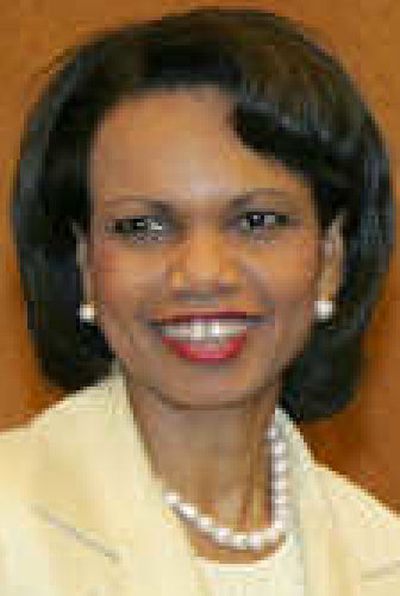Rice urges democracy in Mideast

CAIRO, Egypt – Secretary of State Condoleezza Rice prodded Middle Eastern leaders Monday to reform their governments, declaring that the United States no longer is willing to accept regional stability at the expense of political freedom.
“Throughout the Middle East, the fear of free choices no longer can justify the denial of liberty,” Rice said in an address as notable for its setting – Egypt, an important U.S. ally – as for its content. “It is time to abandon the excuses that are made to avoid the hard work of democracy.”
Egypt will hold its first multiparty election this fall, but opposition groups say the voting is a sham set up to favor the ruling party of Egyptian President Hosni Mubarak.
“Liberty is the universal longing of every soul, and democracy is the ideal path for every nation,” Rice told a polite but restrained audience of about 600 invited government officials, academics and others at American University.
As she has done in speeches in the United States and elsewhere since taking over from Colin Powell in January, Rice said the United States is just as committed to democratic change and open elections in the Middle East as elsewhere in the world. She pointed to elections in Iraq, the Palestinian territories and Lebanon.
“For 60 years, my country, the United States, pursued stability at the expense of democracy in this region, here in the Middle East, and we achieved neither,” she said. “Now, we are taking a different course. We are supporting the democratic aspiration of all people.”
Her message was mixed, however.
For all of Rice’s forceful rhetoric, she pulled some punches when addressing the progress of democratic change in Egypt and Saudi Arabia. And she refused to see representatives of Egypt’s largest Islamic opposition movement, the Muslim Brotherhood, because the group is banned by the Mubarak government.
The Muslim Brotherhood, like several smaller opposition groups, criticizes the United States for being too cozy with Mubarak. Some opposition figures boycotted a discussion session she held after her speech at American University in Cairo. Afterward, she flew to Saudi Arabia.
In her remarks, Rice strongly rebuked two countries – Syria and Iran – that long have been on the outs with Washington.
She called Syria a “police state” that has acted as a foreign master in neighboring Lebanon. Of Iran, she said, “The appearance of elections does not mask the organized cruelty of Iran’s theocratic state.”
Governments in the Middle East are mostly monarchies or family dynasties, as in Saudi Arabia, or centralized, nearly one-party regimes, as in Egypt. The United States lists both Saudi Arabia and Egypt as human-rights abusers and has cited Saudi Arabia as a nation that does little to combat human trafficking.
Rice praised Mubarak for moving to hold elections, but said she is concerned for the future of Egypt’s reform because of violence visited on “peaceful supporters of democracy.” Last month, Mubarak supporters pulled and kicked opposition activists in the street during a preparatory referendum.
“President Mubarak has unlocked the door for change. Now, the Egyptian government must put its faith in its own people,” she said.
“The Egyptian government must fulfill the promise it has made to its people and to the entire world by giving its citizens the freedom to choose.”
Rice called for an end to emergency laws in Egypt, a frequent demand of the opposition and reformers. The laws give police wide powers to make arrests, among other actions.
“The day must come when the rule of law replaces emergency decrees,” she said.